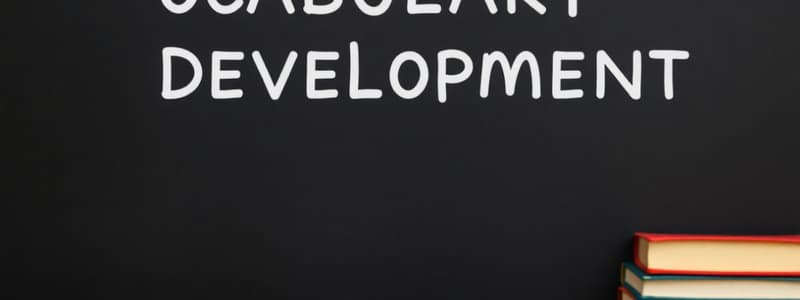Podcast
Questions and Answers
Which strategy involves creating visual diagrams to link words with similar meanings?
Which strategy involves creating visual diagrams to link words with similar meanings?
- Morphological Analysis
- Semantic Mapping (correct)
- Word Mapping
- Repeated Exposure
What is the primary benefit of having a strong vocabulary?
What is the primary benefit of having a strong vocabulary?
- It is solely focused on oral communication.
- It allows for writing poetry only.
- It reduces the need for reading.
- It enhances understanding of texts and ideas. (correct)
What type of vocabulary consists of words recognized and understood when heard?
What type of vocabulary consists of words recognized and understood when heard?
- Writing Vocabulary
- Speaking Vocabulary
- Listening Vocabulary (correct)
- Reading Vocabulary
Which strategy for vocabulary development involves using surrounding text to infer meanings?
Which strategy for vocabulary development involves using surrounding text to infer meanings?
What is a key feature of morphological analysis in vocabulary development?
What is a key feature of morphological analysis in vocabulary development?
How does repeated exposure contribute to vocabulary development?
How does repeated exposure contribute to vocabulary development?
Which of the following is not a type of vocabulary mentioned?
Which of the following is not a type of vocabulary mentioned?
What resources can be used for vocabulary development?
What resources can be used for vocabulary development?
What does the term 'fortuitous' primarily describe?
What does the term 'fortuitous' primarily describe?
Which of the following words best describes someone who is 'elated'?
Which of the following words best describes someone who is 'elated'?
What does 'rambunctious' imply about behavior?
What does 'rambunctious' imply about behavior?
In the context of starting something, what does 'initiated' mean?
In the context of starting something, what does 'initiated' mean?
What is the meaning of the word 'elegant'?
What is the meaning of the word 'elegant'?
What does 'elated' mean?
What does 'elated' mean?
What part of speech is 'escapade'?
What part of speech is 'escapade'?
The term 'fortuitous' refers to something bad that happens by chance.
The term 'fortuitous' refers to something bad that happens by chance.
What is the verb form of 'initiate' used in the context of the book?
What is the verb form of 'initiate' used in the context of the book?
To __________ is to float or move lightly.
To __________ is to float or move lightly.
Innate refers to something learned through experience.
Innate refers to something learned through experience.
What does 'prosper' mean?
What does 'prosper' mean?
Which of the following best describes 'formal'?
Which of the following best describes 'formal'?
What is the noun form of 'attire'?
What is the noun form of 'attire'?
Something described as 'elegant' is fancy and refined.
Something described as 'elegant' is fancy and refined.
To be __________ means to be fascinated.
To be __________ means to be fascinated.
What does 'rambunctious' mean?
What does 'rambunctious' mean?
What is the meaning of 'reprimand'?
What is the meaning of 'reprimand'?
A 'feisty' person is usually calm and reserved.
A 'feisty' person is usually calm and reserved.
What does 'headstrong' mean?
What does 'headstrong' mean?
Study Notes
Vocabulary Development
Importance of Vocabulary
- Essential for reading comprehension and communication.
- A strong vocabulary enhances understanding of texts and ideas.
- Correlates with academic success and literacy skills.
Strategies for Vocabulary Development
-
Context Clues
- Use surrounding text to infer meanings of unfamiliar words.
- Look for synonyms, antonyms, or explanations nearby.
-
Word Mapping
- Visual representation of a word and its attributes (definition, synonyms, antonyms, use in a sentence).
- Helps deepen understanding and retention.
-
Morphological Analysis
- Break down words into roots, prefixes, and suffixes.
- Understanding parts of words can aid in deciphering meanings.
-
Semantic Mapping
- Create visual diagrams linking words with similar meanings or related concepts.
- Facilitates connections and broader understanding.
-
Repeated Exposure
- Encountering words in diverse contexts reinforces learning.
- Encourage reading a variety of texts (fiction, non-fiction, poetry).
-
Engaging with New Words
- Incorporate new vocabulary into spoken and written language.
- Use in discussions, writing exercises to reinforce usage.
Types of Vocabulary
- Listening Vocabulary: Words recognized and understood when heard.
- Speaking Vocabulary: Words used in oral communication.
- Reading Vocabulary: Words understood when reading.
- Writing Vocabulary: Words used in written texts.
The Role of Reading in Vocabulary Development
- Reading widely increases exposure to new words.
- Different genres introduce varied vocabulary; fiction often includes descriptive language, while non-fiction introduces technical terms.
Assessment of Vocabulary Knowledge
- Use tools like quizzes, flashcards, and educational games.
- Conduct informal assessments through discussions and written responses.
Resources for Vocabulary Development
- Use vocabulary lists and flashcards.
- Access educational websites and mobile applications for interactive learning.
- Engage with literature circles or book clubs for discussion and exploration of new words.
Importance of Vocabulary
- Essential for reading comprehension and communication.
- A strong vocabulary enhances understanding of texts and ideas.
- Correlates with academic success and literacy skills.
Strategies for Vocabulary Development
- Context Clues: Use surrounding text to understand unfamiliar words.
- Word Mapping: Visualize a word and its attributes (definition, synonyms, antonyms, use in a sentence) to improve understanding and retention.
- Morphological Analysis: Break down words into roots, prefixes, and suffixes to decipher meanings.
- Semantic Mapping: Create visual diagrams linking words with similar meanings or related concepts to facilitate connections and broaden understanding.
- Repeated Exposure: Encountering words in diverse contexts reinforces learning.
- Engaging with New Words: Incorporate new vocabulary into spoken and written language for reinforcement.
Types of Vocabulary
- Listening Vocabulary: Words recognized and understood when heard.
- Speaking Vocabulary: Words used in oral communication.
- Reading Vocabulary: Words understood when reading.
- Writing Vocabulary: Words used in written texts.
The Role of Reading in Vocabulary Development
- Reading widely increases exposure to new words.
- Different genres introduce varied vocabulary; fiction often includes descriptive language, while non-fiction introduces technical terms.
Assessment of Vocabulary Knowledge
- Use tools like quizzes, flashcards, and educational games.
- Conduct informal assessments through discussions and written responses.
Resources for Vocabulary Development
- Use vocabulary lists and flashcards.
- Access educational websites and mobile applications for interactive learning.
- Engage with literature circles or book clubs for discussion and exploration of new words.
Vocabulary for The Boy on the Wooden Box
- Elated: Expressing extreme happiness and excitement. Elation is the feeling of being extremely happy and excited.
- Escapade: An exciting, daring, or adventurous act or incident.
- Fortuitous: Lucky; happening by chance rather than planning. Fortuitously describes something that happens luckily.
- Initiated: Started or caused something to begin.
- Waft: To float or move gently through the air, like smells or feathers.
- Innate: A natural ability or quality that someone is born with. Innately means in a natural way.
- Prosper: To thrive and do well, especially financially.
- Formal: Official, polite, or fancy. Formally means in a proper and official way. Formality refers to the state of being official and polite.
- Attire: Clothing. Can also be a verb meaning to dress.
- Elegant: Fancy and refined. Elegantly describes something that is done in a fancy and refined way. Elegance is the quality of being fancy and refined.
- Enthralled: Completely fascinated, captivated, or enthralled by something. Enthrall is the verb meaning to completely fascinate or captivate someone.
- Rambunctious: Wild and unruly, full of energy and boisterousness. Rambunctiously describes something that is done in a wild and unruly way.
- Altercation: A loud and heated dispute or argument.
- Reprimand: To scold or criticize formally. Can also be a noun meaning a formal rebuke.
- Glamorous: Excitingly attractive and appealing. Glamorously describes something that is done in a glamorous way. Glamor is the quality of being excitingly attractive and appealing.
- Feisty: Spirited and aggressive, full of energy and determination. Feistily describes someone who is spirited and aggressive. Feistiness is the quality of being spirited and aggressive.
- Headstrong: Self-willed and stubborn, refusing to be controlled by others.
Words and Meanings
- Elated: Means extremely happy and excited. "The boy was elated when he received the surprise gift."
- Escapade: Refers to an exciting, daring, or adventurous act. "Their escapade in the abandoned house was full of thrills and chills."
- Fortuitous: Means lucky and happening by chance. "The fortuitous meeting led to a lifelong friendship."
- Initiated: Means to start or cause something. "The teacher initiated the discussion about the book."
- Waft: Means to float or move lightly, like feathers or smells. The fragrant scent of cinnamon wafted from the bakery."
- Innate: Means inborn or present from birth. "The baby had an innate ability to sing."
- Prosper: Means to thrive or do well, especially financially. "Her business prospered after she opened a new location."
- Formal: Means official, polite, or fancy. "The formal dinner required elegant attire."
- Attire: Means clothing. "He wore his finest attire for the special occasion."
- Elegant: Means fancy and refined. "The elegant design of the building captured everyone's attention."
- Enthralled: Means fascinated. "The children were enthralled by the magician's tricks"
- Rambunctious: Means wild, unruly. "The rambunctious children were running around the playground."
- Altercation: Means a noisy, heated dispute or argument. "The two neighbors had a loud altercation over the fence."
- Reprimand: Means to scold or criticize formally. "The principal reprimanded the student for breaking the rules."
- Glamorous: Means excitingly attractive. "Her glamorous appearance turned heads wherever she went."
- Feisty: Means spirited and aggressive. "The feisty puppy defended its food fiercely."
- Headstrong: Means self-willed and stubborn. "Her headstrong nature often led to conflict."
Studying That Suits You
Use AI to generate personalized quizzes and flashcards to suit your learning preferences.
Description
This quiz explores essential strategies for vocabulary development, emphasizing the importance of vocabulary for reading comprehension and communication. Discover techniques such as context clues, word mapping, and morphological analysis to enhance your vocabulary skills effectively.




